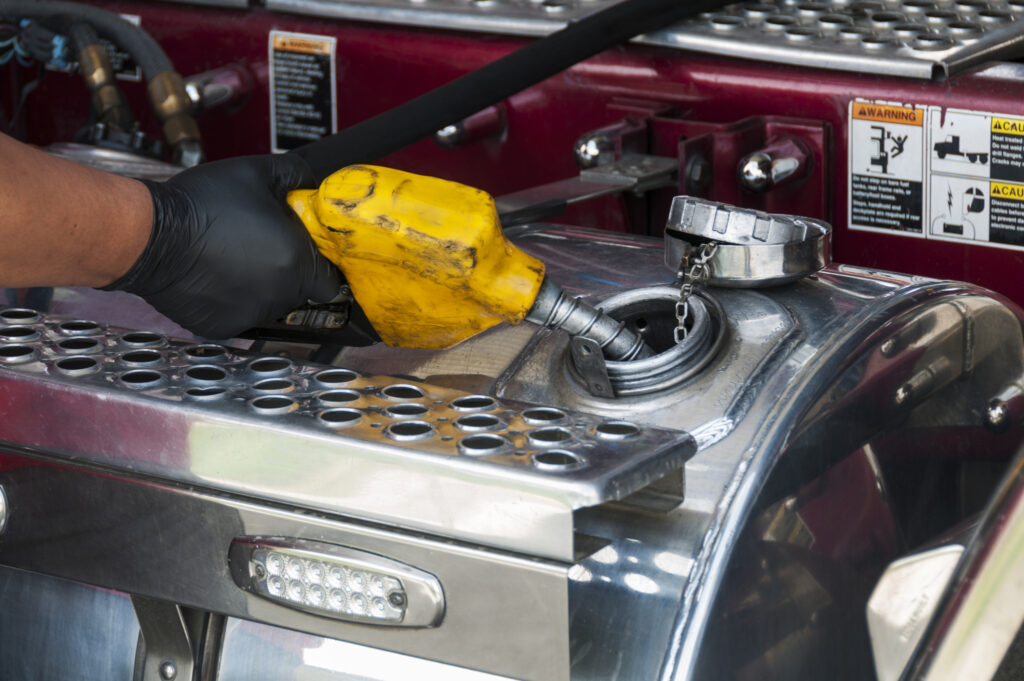Costs of fuel fraud continue to climb
Fuel fraud is on the rise and trucking companies are struggling to stay ahead of the growing problem.
Hemant Banavar, vice-president of financial products with Motive, addressed the issue at the American Trucking Associations’ Management Conference & Exhibition in Austin, Texas this week, dubbing fuel theft a “silent epidemic in this industry today.”

“Costs are rising on every front,” Banavar said, adding “2022 was the most expensive year to be in the fleet business.”
The cost of doing business for trucking companies rose 21% last year, Banavar said, emphasizing the need for companies to do more to stamp out fraudulent fuel purchases.
“Fraud is one of those hidden costs that we don’t talk about often, but is still driving down profitability in the business,” he said.
A simple show of hands in the audience revealed many fleet managers present acknowledged they suspect fuel fraud is happening within their operations. Just how much it’s costing them remains elusive. Banavar said card skimming activity is up 77% so far this year, with 120,000 card-skimming incidents reported in the first half of this year alone.
Fraud-as-a-service
In some cases, card skimmers will fuel up personal vehicles or make in-store purchases using the stolen card information. But there’s another growing trend to worry about, dubbed “fraud-as-a-service,” in which stolen card data and personal information is sold on the dark web.
Other forms of theft include: card cloning (replicating fuel cards with skimmed data); promotional scams (fake offers for free fuel or other incentives in exchange for entering card information, which is then stolen); vendor theft (in which the vendor overcharges and takes a cut of the total purchase price); phishing (fake emails requesting personal information); employee fraud (filling up personal vehicles or adding items like cigarettes to fuel purchases using a fleet fuel card); siphoning fuel from company trucks; and side fueling (filling up a personal vehicle alongside the company truck on the company fuel card).
In a third-party survey commissioned by Motive, nearly 50% of fleet respondents estimated that up to 5% of their total fuel spend was fraudulent. In that case, a fleet of 200 trucks would be losing more than $500,000 a year to fuel fraud.
Why aren’t fleets doing more to prevent it?
“Companies find it really difficult to know what’s happening,” said Banavar. “They don’t have the visibility they need and because they can’t put a number on how big this problem is, they’re shying away from it because the return on investment is unclear. They don’t have the visibility, tools and accuracy [they need] so they are choosing not to realize the full potential [of the problem].”
Fleet data and spend data are usually viewed through disparate systems making it difficult to identify fraudulent activity.
Reduce number of fuel cards
Banavar said fleets should minimize the number of fuel cards they have in circulation, ideally choosing only one supplier, so that they can reduce the likelihood of being defrauded. They also need to streamline the systems they have in place to track fuel purchasing.
Manual matchbacks comparing fuel purchases to mileage are “difficult to perform” and need to be done regularly. By the time a potential infraction is noticed, it could be weeks since the theft occurred.
Artificial intelligence and automation will help fleets get a handle on fraud, Banaver noted, by bringing all the fleet’s data from fuel purchases, to miles driven, to miles per gallon, into a single stream of data and quickly flagging anomalies.
“It takes away a lot of the manual overhead and repetitive tasks,” he said. “It increases accuracy and the ability to detect things that otherwise wouldn’t have been detected.”
Fuel purchasing controls need to be put into place, including time of day and merchants either whitelisted or blacklisted.
“Look beyond chip and pin to gain enhanced card security to protect your business,” Banaver said, noting pin and chip technologies are vulnerable to card skimming and video capture. Phone-based unlocking is a good tool, he added, providing another layer of protection since the driver must have an approved phone in his or her possession to complete the transaction.
But in addition to technological tools, Banavar said education of all employees is vital.
“You have to invest in both driver training and employee training on how to spot potential fraud,” he urged. “You have to build a fraud culture within your company to make people aware of this so they can spot this easily. It’s not one person’s job.”
Have your say
This is a moderated forum. Comments will no longer be published unless they are accompanied by a first and last name and a verifiable email address. (Today's Trucking will not publish or share the email address.) Profane language and content deemed to be libelous, racist, or threatening in nature will not be published under any circumstances.